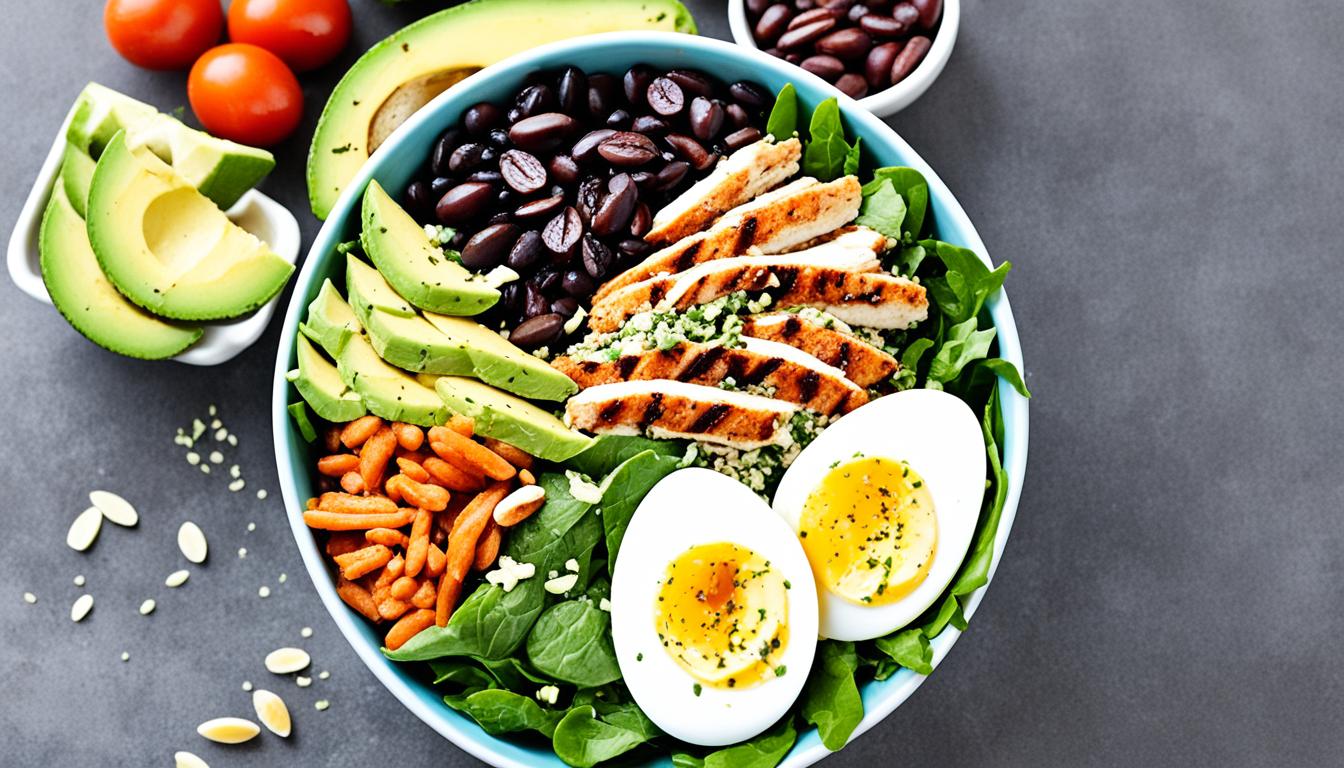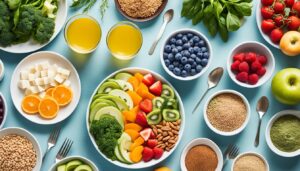Looking for a tasty way to boost your health? Try protein salads! They are full of important nutrients and are very flavorful. These salads are perfect for anyone wanting to eat better.
Not only are protein salads delicious, they are also good for you. They help with digestion and managing your weight. You can find many high-protein recipes to keep things interesting.
This article will go deep into the benefits of protein salads. It will also give you tips on how to make them filling and tasty. So, pick up a fork and get ready to enjoy a protein salad today!
Key Takeaways:
- Protein salads are a delicious and nutritious way to improve your health.
- These salads are packed with essential nutrients and are perfect for a low-carb lifestyle.
- Enjoying protein salads regularly can support digestion, weight management, and overall well-being.
- There are numerous high-protein recipes available to keep your salad options exciting and satisfying.
- By incorporating protein-rich ingredients, you can create balanced and satiating meals that will leave you feeling energized and satisfied.
The Benefits of Eating Salad Every Day
Eating salad every day is great for your health. Salads let you mix many healthy salad bits, like veggies, fruits, and proteins. These bits are full of vitamins, minerals, and fiber. This makes salads a nutritious salad pick for daily meals.
Salads are good for your gut health. They have lots of fiber which helps your digestion and stops constipation. The water in veggies and fruits keeps you hydrated. This makes sure your digestive system works well.
If you’re watching your weight, salads are smart choices. They don’t have many calories, but they make you feel full. The fiber and protein in salads stop you from eating too much. This helps with weight control.
Eating salads can up your nutrient game. Adding different veggies and fruits to your meals boosts your daily intake of fruits and vegetables. These foods have tons of vitamins and antioxidants, keeping you healthy and helping your immune system.
“Eating salads regularly can support healthy digestion, contribute to weight management, and provide important nutrients for optimal health.”
Salads pack a nutritional punch. They’re loaded with vitamins like A, C, and E, which keep cells healthy. They also have minerals like potassium and magnesium, key for the body to function right.
To wrap up, salads are awesome for your health. They help with digestion, weight control, and getting more nutrients. Tossing different ingredients into your high-protein salad meets these health goals. So, start today and reap the tasty, healthy perks of salads!
The Importance of Fiber in Protein Salads
Fiber plays a key role in protein salads. It helps keep your digestive system healthy and promotes regular bowel movements. Including high-fiber foods in these salads makes sure you get enough fiber for good health.
Fiber brings many health perks. It lowers the risk of heart disease and helps manage blood sugar levels. Plus, it makes you feel full, which supports weight control.
Add different fiber-rich foods to your protein salads for more benefits. Broccoli, bell peppers, and leafy greens are packed with fiber. Chickpeas and black beans add fiber and protein from plants. Don’t forget whole grains like quinoa and brown rice.
This table shows the fiber in common ingredients:
| Ingredient | Fiber Content (per 100g) |
|---|---|
| Broccoli | 2.6g |
| Spinach | 2.2g |
| Chickpeas | 7.6g |
| Quinoa | 2.8g |
These ingredients offer lots of protein and fiber. They’re great for your salads.
Increasing Your Fiber Intake
For more fiber, add other foods to your meals. Berries, apples, and pears are full of fiber. Chia seeds and flaxseeds make salads crunchy and nutritious. Also, almonds and walnuts provide healthy fats and lots of fiber.
Remember, drink plenty of water when you eat more fiber. This helps avoid digestive problems and ensures fibers move smoothly through your system.
Adding fiber-rich foods to protein salads makes them tasty and health-boosting. They support your digestive health, keep your bowels moving, and bring vital nutrients for your well-being.
Meeting Your Daily Fruit and Vegetable Recommendations
Protein salads can help you eat enough fruits and vegetables each day. The Centers for Disease Control and Prevention say many Americans don’t get enough of these foods. They miss out on important nutrients. Adding a protein salad to your meals makes it easy to get more fruits and veggies. This boosts your health.
Protein salads are a tasty and handy way to eat more fruits and vegetables. You can choose from many types, like a garden salad or a fruit salad with protein. Each bite fills you with vitamins, minerals, and antioxidants. These are good for your health.
The Importance of Fruit and Vegetable Intake
Fruits and vegetables are full of fiber, vitamins, minerals, and antioxidants. They help keep your immune system strong and reduce disease risks. Eating different fruits and veggies covers your nutritional needs. It makes you healthier.
Eating the right amount of fruits and vegetables brings many health perks. These include less heart disease risk and better digestion. Your immune system gets stronger, and it can help you manage your weight. It also protects against some cancers.
Adding a protein salad to your meals is a yummy way to care for your health. It increases your fruit and vegetable intake. Plus, it gives you protein and other key nutrients.
| Fruit and Vegetable Intake Guidelines | Recommended Daily Servings* |
|---|---|
| Fruits | 2 cups |
| Vegetables | 2.5 cups |
*These recommendations may vary based on age, sex, and how active you are. Talk to a health expert or dietitian for advice tailored to you.
Being aware of how many fruits and veggies you eat is vital. Mixing protein salads into your diet ensures you get needed nutrients. Try different protein salad recipes. Be creative with the ingredients. Discover tasty and healthful options.
Essential Vitamins and Minerals in Protein Salads
Protein salads are more than tasty. They pack essential vitamins and minerals for health. Adding spinach, kale, and romaine lettuce gives you vitamins A, C, and E. These help with eye health, boost the immune system, and fight some cancers.
Salads are rich in important minerals too. They have potassium, iron, and magnesium for body wellness. Potassium keeps the heart healthy and muscles working right. Iron makes red blood cells, fighting anemia. Magnesium strengthens bones, controls blood pressure, and helps enzymes work.
“Eating a protein salad is great for getting many vitamins and minerals,” notes Dr. Jessica Bennett. “Mixing many nutrient-rich foods supports your body’s best performance and wellness.”
Leafy Greens: Nutritional Powerhouses
Protein salads lean on leafy greens for good health. Spinach is full of iron and vitamin E for vision and skin. Kale brings in antioxidants, vitamins A and C, plus calcium for strong bones and immunity. Romaine has fiber, vitamin K, and folate, crucial for blood and cells.
Other Nutrient-rich Ingredients
Protein salads also mix in other healthy foods. Adding colors with bell peppers, carrots, and tomatoes brings more vitamins and antioxidants. Proteins like chicken, chickpeas, or tofu add taste, texture, and muscle-building amino acids. Throw in nuts and seeds for extra healthy fats and minerals.
The Benefits of a Nutrient-dense Diet
Add protein salads to your diet for lots of vital nutrients. They support your body functions and improve health. Want to boost immunity, keep bones strong, or better your vision? Nutrient-rich salads are a tasty, healthy choice.
Enjoying a protein salad means enjoying many flavors and nourishing your body. Every colorful bite is a step toward better health and vitality.
Promoting a Healthy Gut with Protein Salads
Your gut health is vital for your overall well-being. Adding protein salads to your diet can boost your gut health. This brings many benefits.
“A healthy gut is essential for optimal digestion, improved immune function, and overall wellness.”
Salads are packed with polyphenols. These compounds in plants help grow beneficial bacteria in your gut. Polyphenols have prebiotic and antimicrobial properties. This promotes a healthy gut microbiome.
Eating protein salads regularly increases polyphenols in your diet. This supports good bacteria in your gut. It can improve your digestion, enhance nutrient absorption, boost your immune system, and even improve your mental health.
More than Just Fiber
Fiber is great for gut health, but polyphenols offer extra support. They are antioxidants. They reduce gut inflammation and protect bacterial balance.
“Polyphenols are like superheroes for your gut, fighting off harmful microbes and nurturing the growth of beneficial bacteria.”
Research links more polyphenols to more good bacteria, like AkKermansia muciniphila and Bifidobacterium. These bacteria aid gut health, reduce inflammation, and boost metabolism.
So, enjoying protein salads not only feeds your body essential nutrients. It also boosts good bacteria for a healthier gut.
Building a Beneficial Salad
For better gut health with protein salads, use varied polyphenol-rich foods. Here are some great options:
- Leafy greens like spinach, kale, and arugula
- Berries, such as blueberries, strawberries, and raspberries
- Cruciferous vegetables like broccoli and cauliflower
- Artichokes and onions
- Herbs and spices like turmeric, ginger, and oregano
Mix these ingredients for delicious, gut-healthy salads. Feel free to experiment and find your favorite mix.
A Healthy Gut for a Healthy You
Looking after your gut is key to feeling good. Protein salads loaded with nutrients support your gut’s good bacteria.
“A healthy gut sets the foundation for a healthy you.”
Next meal, think of your gut. Enjoy a tasty protein salad. Your gut will be happy!
| Gut Health Benefits of Protein Salads | Recommended Ingredients |
|---|---|
| Promote the growth of beneficial bacteria | Leafy greens, berries, cruciferous vegetables, artichokes, onions, herbs, and spices |
| Reduce inflammation in the gut | Turmeric, ginger |
| Support gut barrier function | Leafy greens, berries |
Creating Balanced and Satiating Protein Salads
Finding the right mix of flavors and ingredients is key in protein salads. Your salad should be full of nutrients and keep you full. Include various protein sources and healthy fats for a balanced, filling meal.
Adding protein to your salad makes it more satisfying. Try cheese, tofu, beans, chicken, or eggs. These add flavor and keep you full longer. Protein helps you feel full, cutting down on snacking.
Adding healthy fats, like nuts, seeds, and avocado, makes salads more filling. They add crunch and help you feel full longer. These fats digest slowly, keeping you satisfied.
Pick different vegetables to make your salad balanced. Leafy greens, tomatoes, cucumbers, and bell peppers add vitamins, minerals, and flavor.
Finish your salad with a tasty dressing. Use homemade dressings to avoid extra sugars. A simple vinaigrette with olive oil, lemon juice, and herbs works great.
With balanced protein salads, you get a nutritious, satisfying meal. Mix ingredients to find what tastes best and meets your health needs.
Protein Salad Recipe Ideas
Need inspiration for balanced protein salads? Here are some ideas:
- Southwest Chicken Salad: Begin with mixed greens. Add grilled chicken, black beans, corn, avocado, and cilantro lime dressing.
- Greek Quinoa Salad: Mix quinoa, cherry tomatoes, cucumbers, olives, feta cheese, and lemon herb dressing. Serve on spinach or romaine.
- Asian Tofu Salad: Marinate tofu in soy ginger sauce, then pan-sear. Mix with greens, carrots, bell peppers, edamame, and sesame ginger dressing.
These recipes strike a perfect balance of protein, veggies, and fats. They keep you satisfied and nourished all day.
Protein Salads and Weight Loss
Eating protein salads can help you meet your weight loss targets. These salads keep calories low while making you feel full. They are full of fiber, which keeps you from eating too much. Fiber-rich leafy greens are key in these salads.
Controlling how much you eat is vital for losing weight. Protein salads are great because they’re filling but low in calories. Choosing light toppings and dressings makes salads even better for losing weight.
Want some tips for making tasty, low-calorie protein salads? Here you go:
- Pick proteins that are low in fat, like grilled chicken, tofu, or tuna in water.
- Add a mix of colorful veggies for taste and health benefits.
- Try using herbs and spices for flavor without adding calories.
- Opt for vinegar-based dressings or make your own with healthy ingredients.
- Stay away from toppings that are high in calories, like croutons or too much cheese.
Losing weight happens slowly. Eating right is all about balance. Protein salads are a smart choice. They give you the nutrients you need while helping you get to your goal.
| Salad Ingredients | Calories | Protein (g) | Fiber (g) |
|---|---|---|---|
| Spinach and Grilled Chicken Salad | 225 | 25 | 4 |
| Mixed Greens with Tuna Salad | 180 | 20 | 3 |
| Kale and Quinoa Salad | 285 | 15 | 8 |
High-protein salads are a great choice for losing weight. They’re full of fiber and lean proteins. This means you can enjoy a tasty meal without too many calories.
Salad as a Part of a Healthy Eating Plan
Salad is key to a healthy diet and can make meals more nutritious. It’s essential to use a mix of veggies, protein, and healthy fats in your salad. This makes your meals both filling and nutritious. Just having greens might not be enough for your nutrition needs. A variety of ingredients makes salads both healthy and delicious.
“A well-made salad must have a certain simplicity about it, with a variety of flavors and textures that come together to create a harmonious dish.”
– Yotam Ottolenghi
Here’s how to make a nutritious protein salad:
- Start with leafy greens for vitamins and fiber.
- Add colorful veggies for different tastes and textures.
- Choose a protein like chicken, salmon, tofu, or beans for fullness.
- Put in healthy fats such as avocado, nuts, or seeds for better taste.
- Try homemade dressings with olive oil and herbs instead of store-bought.
With these tips, you’ll make tasty salads that are also good for you. Listen to your hunger and enjoy your salad as part of a balanced diet.
Benefits of a Healthy Salad
Eating healthy salads can:
- Improve your nutrient intake: They’re great for getting more vitamins, minerals, and fiber.
- Help with weight control: They can manage your appetite and support weight management.
- Boost your energy: The mix of veggies, protein, and fats gives you steady energy.
- Lower disease risk: Eating diverse veggies and fruits can protect against illnesses.
Whether for lunch or dinner, salads are a tasty and healthy choice. They help you stay well. Enjoy making varied and nutrient-packed salads as part of your healthy eating plan.
Tips for Building a Healthy Protein Salad
Creating a healthy protein salad is all about wise ingredient choices. These tips ensure your salad is both delicious and nutritious. They help you feel full and energized.
Start with a Base of Leafy Greens
A good salad starts with leafy greens. Spinach, kale, or mixed greens are great options. They’re rich in vitamins and add a nice crunch.
Add a Variety of Vegetables and Fruits
Add lots of vegetables and fruits to boost your salad’s nutrition. Mix raw and cooked ones for different textures. Think about adding tomatoes, cucumbers, carrots, or even strawberries.
Include Protein Sources
Don’t forget protein to make your salad filling. Options include grilled chicken, boiled eggs, or beans. Protein helps keep you full longer.
Consider Healthy Fats
Healthy fats add flavor and nutrients. Use avocado, nuts, or seeds. They add to your salad’s satisfaction and provide essential fatty acids.
Homemade Dressing for Extra Flavor
Make your own dressing to avoid additives. Mix olive oil, lemon juice, and Dijon mustard. Homemade dressings let you customize flavors and ingredients.
Experiment with Flavors and Textures
Salad making allows for flavor and texture experimentation. Try feta cheese, almonds, or dried cranberries. Mixing in these items takes your salad to the next level.
Can You Eat Too Much Salad?
Salads can improve your diet, but balance is essential. It’s key not to eat too much salad.
Depending too much on salads may lead to missing out on important nutrients. Salads are nutritious but can’t give you everything you need.
It’s important to eat a variety of foods. This ensures you get every nutrient you need. Adding proteins, grains, fruits, and veggies with your salads is wise.
Instead of solely focusing on excessive salad consumption, aim for a balanced diet that includes salads as part of a nutritious meal rotation.
To eat healthily, mix it up. Add different foods to your meals. This helps you meet your nutritional needs and enjoy salads too.
Preventing Nutrient Deficiencies
Salads have many good things like vitamins and fiber. But they might not have enough of other nutrients. Salads often lack enough carbs, proteins, fats, vitamins, and minerals.
Eating a range of whole foods helps avoid nutrient gaps. A varied diet can prevent the shortages that too many salads can cause.
Incorporating a Balanced Meal Plan
A good meal plan covers all your nutritional bases. Salads are great but need company. Include foods with key nutrients in your diet.
Try adding lean proteins, complex carbs, and healthy fats. Foods like chicken, fish, tofu, whole grains, avocados, or nuts make meals complete. They make sure salads are part of a nourishing meal.
Listen to Your Body
Your body knows what it needs. Pay attention to how it reacts to different foods. Adjust your meals to fit your body’s responses.
If salads aren’t filling you up or giving you energy, change your diet. Add more variety to your meals. Balance, moderation, and variety are vital for a healthy diet.
Ultimately, a balanced diet that incorporates salads along with other foods can ensure that you’re getting all the nutrients you need for optimal health.
Conclusion
Protein salads are great for your health and taste amazing. They let you mix many veggies, fruits, and proteins. This mix is full of key nutrients good for your health.
These salads suit different needs like losing weight or improving digestion. They’re full of fiber, vitamins, and minerals. This helps your gut health, promotes regular bathroom visits, and boosts your immune system.
Protein salads also help you eat more fruits and veggies, which many miss out on. They fill you up because of their high protein. This makes them perfect for managing weight.
Adding protein salads to your daily meals is smart. You can try new ingredients, discover flavors, and make salads you enjoy. Protein salads feed your body and make your taste buds happy.





